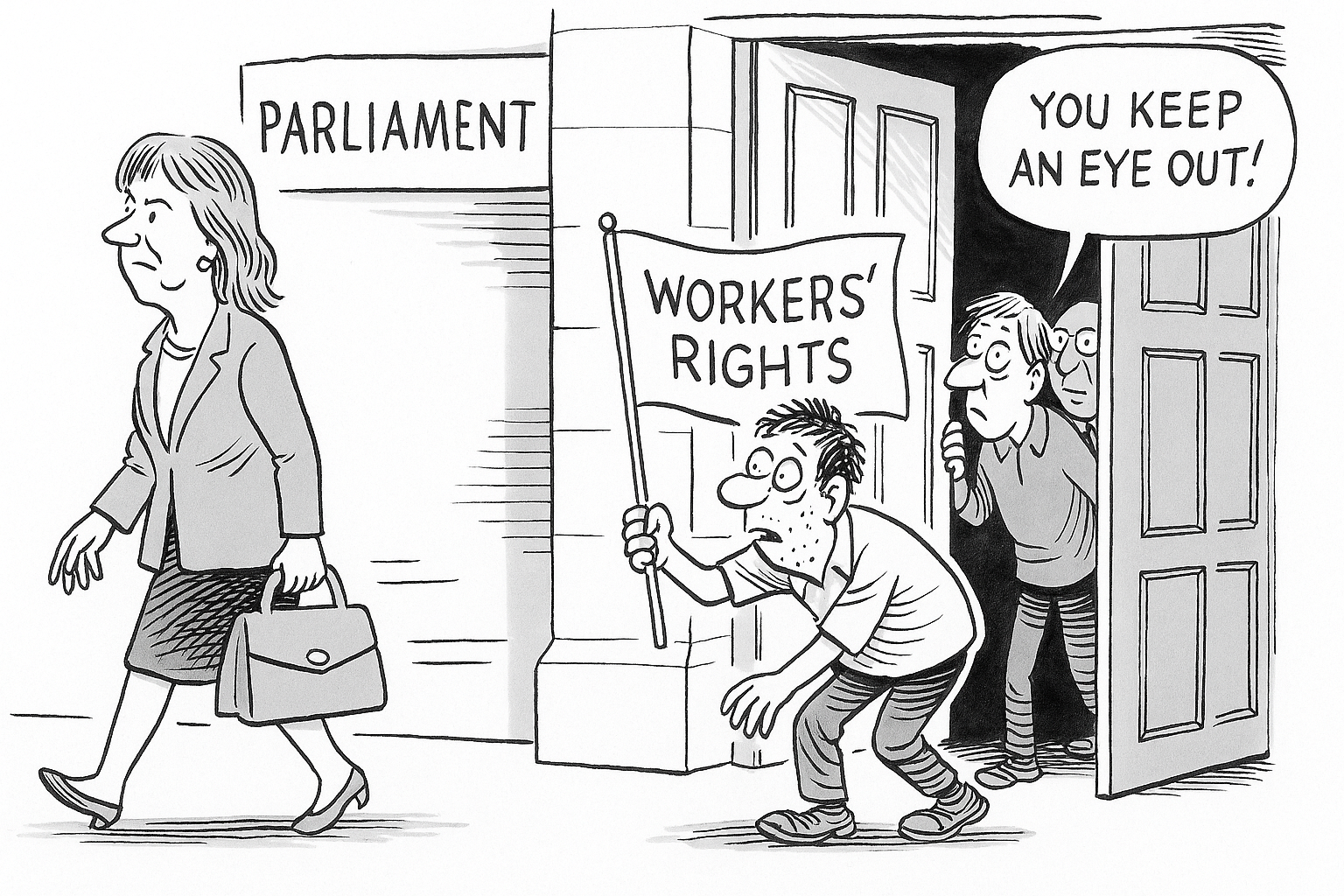After Rayner: What’s Next for Workers’ Rights and Business in Britain?
Posted by Stelios on 5th Oct 2025 Reading Time:
Angela Rayner’s sudden departure from government has sent shockwaves through Westminster — and across Britain’s high streets. For business owners in hospitality, from pubs to fish and chip shops, her exit raises an urgent question: what happens next to the Labour government’s flagship Employment Rights Bill? The answer could reshape how every business in the UK hires, manages, and supports its people.
A Bill Built on Big Promises
When Labour came to power in 2024, Keir Starmer vowed to “make work pay.” The Employment Rights Bill — championed by Rayner — was meant to deliver on that promise. Announced as “the biggest levelling up of workers’ rights in a generation,” the legislation proposed 28 sweeping reforms designed to give employees greater security, dignity and respect at work.
Among its most significant proposals were:
• Guaranteed minimum working hours
• Stronger redundancy protections
• Parental leave and unfair dismissal rights from day one
• Expanded trade union powers
For millions of workers — especially the nine million who’ve been in their jobs for under two years — it promised new protection and stability. But for employers, it represented a fundamental shift in how work is organised.
Why It Matters
The Bill takes aim at a deep-rooted problem: in-work poverty. Over the past three decades, more Britons have found themselves in jobs that don’t pay enough to live securely. Between 1996 and 2024, the share of people in poverty from working families rose from 44% to 65%. It’s a worrying trend — and one that costs the government around £50 billion a year in benefits to top up low wages.
Supporters of the Bill see it as a step toward a fairer, more sustainable economy. Angela Rayner described it as “pro-growth, pro-business, pro-worker” — arguing that greater stability for workers leads to higher productivity and lower turnover. Academic research generally backs this up: when people feel secure in their jobs, they perform better and stay longer.
A Perfect Storm for Employers
Yet, for small and medium-sized businesses — especially those in hospitality — the timing couldn’t be tougher. Rising costs have already become the norm in 2025:
• Employer National Insurance rose from 13.8% to 15%.
• The minimum wage climbed to £12.21 for over-21s and £10 for 18–20-year-olds.
• Rent, energy, and ingredient prices continue to squeeze margins.
For a typical fish and chip shop or café, flexible work arrangements such as zero-hour or part-time contracts often provide breathing space during unpredictable weeks. But if the Bill limits that flexibility, the impact on scheduling, payroll, and profitability could be significant.
As one operator put it, “If you can’t flex your team to match the trade, your margins vanish overnight.”
The Lords Step In
The House of Lords intervened earlier this year to introduce what many saw as a compromise — or a watering down, depending on your perspective. Amendments included:
• Turning the “right to guaranteed hours” into a “right to request”
• Extending unfair dismissal protection to start after six months rather than day one
• Reinstating the 50% turnout threshold for strike ballots
Unions were furious, calling these changes “a betrayal.” Business groups, however, viewed them as a lifeline. The Federation of Small Businesses (FSB) praised the amendments, arguing they give “new workers and new jobs a chance.”
Political Tug of War
Rayner’s exit has reopened the fight over how far Labour will go. Her former allies — including Unite’s Sharon Graham — accuse the government of “saying different things to different partners,” fearing quiet backpedalling behind closed doors. The Trades Union Congress (TUC) insists Labour must hold its nerve, calling the reforms “one of its strongest weapons” in proving it stands for working people.
Meanwhile, newly appointed Business Secretary Peter Kyle has pledged to deliver the Bill “in full,” even as he signals an interest in cutting red tape for companies — a clear sign of the tension at the heart of the policy.
With the Bill’s rollout planned through to 2027, there’s plenty of time for lobbying, delays, and possible dilution. And that uncertainty is what worries business most.
The View from the High Street
Business leaders across the country are warning of unintended consequences. Lord Simon Wolfson of Next and Hugh Osmond, founder of Punch Taverns, have both cautioned that “day-one” dismissal rights could make hiring riskier and slow job creation.
Hospitality, already down 84,000 jobs since last year’s Budget, is particularly exposed. Kate Nicholls, the chairman of UKHospitality, said: “Businesses are understandably wary about the cost and complexity of the more immediate changes in the Employment Rights Bill, particularly alongside increases to National Insurance contributions, employment costs and business rates.”
Her warning reflects the unease of an industry already fighting to stay afloat under rising costs and thinning margins. The British Beer and Pub Association echoed that sentiment, warning the Bill could hurt young or seasonal workers who rely on flexible hours.
In short, businesses are not opposed to fair treatment — they’re asking for realism. As one trade group put it: “Cracking down on bad employers is right. But punishing responsible ones could backfire.”
A Pattern in Policy History
This isn’t the first time Britain has faced a defining moment over employment rights. Tony Blair’s government introduced the Working Time Regulations in 1998, capping weekly hours and formalising paid holiday. A decade later, David Cameron’s coalition loosened tribunal rules to encourage hiring during austerity. Each wave of reform swung the pendulum between flexibility and protection — and each time, business and labour adjusted in turn.
The current Bill is simply the next chapter in that ongoing push and pull — one that could again redefine how the UK balances competitiveness with compassion.
A Balancing Act Between Fairness and Flexibility
At its core, this is a debate about balance. How do you protect workers without stifling the businesses that employ them? The UK’s flexible labour market has long been a competitive advantage — yet it’s also left many workers feeling disposable.
The government’s challenge is to find a middle ground: one that rewards responsible employers while preventing exploitation. As the Bill moves back to the Commons, ministers must decide whether to restore the original reforms or stick with the Lords’ revisions.
Whatever happens, it will reshape the relationship between business and labour for years to come. If Labour strikes the right balance, the UK could emerge with a stronger, fairer labour market — one where both workers and business owners share in stability and success. But if the balance tips too far, the cost could be counted in lost jobs, rising prices, and shuttered shops.
What This Means for You
For business owners in hospitality and fish and chips, here’s what to watch and prepare for:
• Hiring and Contracts: Expect clearer limits on zero-hour and casual contracts. Review how you structure seasonal or student work.
• Dismissal Rules: “Day-one” rights might change, but protection for staff will tighten overall — meaning documentation and HR processes will matter more.
• Payroll Costs: Budget for potential increases in both wages and administration time as new rules come into effect.
• Timeline: The Bill’s full rollout isn’t due until 2027, giving businesses time to adapt — but staying informed will be key.
Smart operators will focus on efficiency, retention, and transparent communication with staff. Businesses that adapt early — blending fairness with flexibility — are the ones most likely to thrive.








